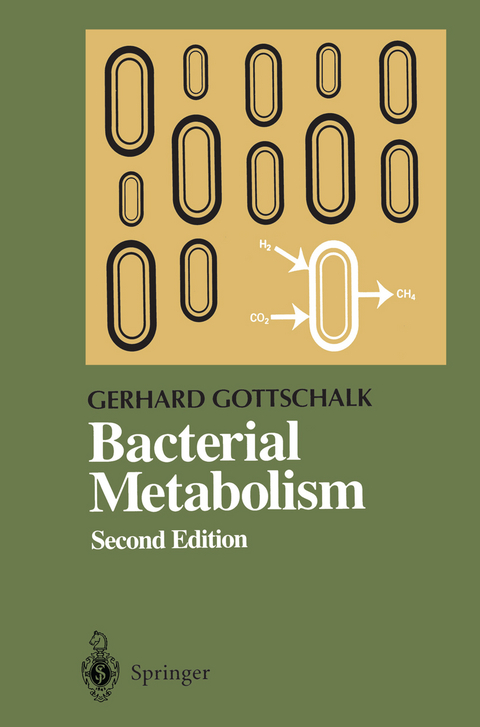
Bacterial Metabolism
Springer-Verlag New York Inc.
978-0-387-96153-8 (ISBN)
This concise yet comprehensive text surveys the field of bacterial metabolism in terms useful to students and researchers. Emphasis is on those metabolic reactions occurring only in bacteria. Thus, the book describes in detail the energy metabolism of the various groups of bacteria. In addition, it examines pathways used by bacteria for the degradation of organic compounds, the synthesis of cellular constituents, the regulation of bacterial metabolism and the fixation of molecular nitrogen.
1 Nutrition of Bacteria.- I. Major and Minor Bioelements.- II. The Two Basic Mechanisms of ATP Synthesis.- III. Nutrients as Energy Sources.- IV. Growth Factor Requirements of Bacteria.- V. Summary.- 2 How Escherichia coil Synthesizes ATP during Aerobic Growth on Glucose.- I. Transport of D-Glucose into theE.coliCell.- II. Degradation of Glucose-6-Phosphate to Pyruvate via the Embden—Meyerhof—Parnas (EMP) Pathway.- III. Oxidative Decarboxylation of Pyruvate to Acetyl-Coenzyme A.- IV. Oxidation of Acetyl-CoA via the Tricarboxylic Acid Cycle.- V. The Formation of ATP in the Respiratory Chain.- VI. Summary.- 3 Biosynthesis ofEscherichia colsCells from Glucose.- I. Composition of E. coli Cells.- II. Assimilation of Ammonia.- III. Assimilatory Reduction of Sulfate.- IV. Biosynthesis of Amino Acids.- V. How Pentose Phosphates and NADPH are Formed.- VI. Ribonucleotides and Deoxyribonucleotides.- VII. Biosynthesis of Lipids.- VIII. Formation of Carbohydrates.- IX. Synthesis of Polymers.- X. The Requirement for an Anaplerotic Sequence.- XI. Summary.- 4 Aerobic Growth of Escherichia coli on Substrates Other Than Glucose.- I. Fructose and Lactose as Substrates.- II. Pentoses as Substrates.- III. Acetate, Pyruvate, and L-Malate as Substrates.- IV. Summary.- 5 Metabolic Diversity of Aerobic Heterotrophs.- I. The Different Mechanisms for the Uptake of Substrates.- II. The Entner-Doudoroff Pathway.- III. Sugar Degradation via the Pentose Phosphate Cycle.- IV. The Methylglyoxal Bypass.- V. Diversity in Energy Metabolism.- VI. Dissimilatory Reduction of Nitrate.- VII. Bacterial Bioluminescence.- VIII. Alternate Anaplerotic Sequences.- IX. Biosynthesis of Monomers and Polymers.- X. Summary.- 6 Catabolic Activities of Aerobic Heterotrophs.- I. Degradation of Polymers by Exoenzymes.- II. Growth with Amino Acids.- III. Growth with Organic Acids.- IV. Growth with Aliphatic Hydrocarbons.- V. Growth with Aromatic Compounds.- VI. Growth with C1Compounds.- VII. Incomplete Oxidations.- VIII.Plasmid-Encoded Catabolic Activities.- IX. Summary.- 7 Regulation of Bacterial Metabolism.- I. Regulation of Enzyme Synthesis by Induction and Repression.- II. Regulation of Enzyme Activity.- III. Summary.- 8 Bacterial Fermentations.- I. Alcohol Fermentation.- II. Lactate Fermentation.- III. Butyrate and Butanol-Acetone Fermentation.- IV. Mixed Acid and Butanediol Fermentation.- V. Propionate and Succinate Fermentation.- VI. Acetate Fermentation.- VII. Methane Fermentation.- VIII. Sulfide Fermentation (Desulfurication).- IX. The Anaerobic Food Chain.- X. Fermentation of Nitrogenous Compounds.- Xl. Summary.- 9 Chemolithotrophic and Phototrophic Metabolism.- I. Chemolithotrophic Metabolism.- II. Assimilation of CO2.- III. Phototrophic Metabolism.- IV. Summary.- 10 Fixation of Molecular Nitrogen.- I. Nitrogen-fixing Organisms.- II. Biochemistry of Nitrogen Fixation.- III. Regulation of Nitrogenase.- IV. Summary.- Further Reading.- Index of Organisms.
| Erscheint lt. Verlag | 19.12.1985 |
|---|---|
| Reihe/Serie | Springer Series in Microbiology |
| Zusatzinfo | XIII, 359 p. |
| Verlagsort | New York, NY |
| Sprache | englisch |
| Maße | 155 x 235 mm |
| Themenwelt | Medizin / Pharmazie ► Medizinische Fachgebiete ► Mikrobiologie / Infektologie / Reisemedizin |
| Naturwissenschaften ► Biologie ► Biochemie | |
| Naturwissenschaften ► Biologie ► Mikrobiologie / Immunologie | |
| ISBN-10 | 0-387-96153-4 / 0387961534 |
| ISBN-13 | 978-0-387-96153-8 / 9780387961538 |
| Zustand | Neuware |
| Haben Sie eine Frage zum Produkt? |
aus dem Bereich


